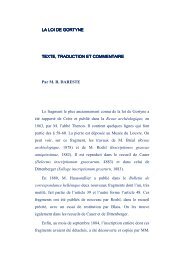CYPRIOT GRAMMAR
CYPRIOT GRAMMAR
CYPRIOT GRAMMAR
You also want an ePaper? Increase the reach of your titles
YUMPU automatically turns print PDFs into web optimized ePapers that Google loves.
Chapter 23: Verbs – The Subjunctive: Present Tense and the<br />
Present Continuous – Ποταχτιτζ’ή: Ενεστώτας τζ’αι<br />
Ενεστώτας Θκιαρκάς (1)<br />
The Subjunctive is a form of verbs which has been almost completely dropped from languages such as English. The only example is the<br />
verb ‘to be’ in wishes. Therefore it will be considerably difficult for an English speaker to grasp its exact meaning. It is a tense typically<br />
used in dependent clauses to express wishes, commands, emotion, possibility, judgment, necessity or statements that are contrary to<br />
present facts. eg. If I were, I want you to go, I would like you to stay etc. When to use it the sentence in Greekcypriot can be fairly simple<br />
because it is almost always accompanied with specific word particles. However there is no specific way of how to form verbs in the<br />
subjunctive.<br />
Now you may of course wonder why do I go into the subjunctive so soon in the course of this book. Well the reason is simple. The<br />
subjunctive is highly important in Greekcypriot because this form of verbs are used to make all the future tenses and composite tenses<br />
such as the present and past perfect. Therefore it will be wrong in my behalf to go into those tenses without explaining before the<br />
subjunctive.<br />
23.1 When to use the Subjunctive Present Tense<br />
As I stated in the previous paragraph the Present Subjunctive can used in dependent clauses to express wishes, commands, emotion,<br />
possibility, judgment, necessity or statements that are contrary to present facts. In Greekcypriot the subjunctive is used with specific<br />
particles which makes it easier to know when to use it. Therefore:<br />
1. για να = in order to<br />
2. αν/εάν, τζ’αν, έστω τζ’αν = if, even if, even if.<br />
3. (Ρήμαν) + να + (ρήμαν) = Verb + to + Verb (Verb + Infinitie)<br />
4. να μεν = not (negative for subjunctive)<br />
5. μεν = don’t *<br />
6. ατζ’α πείς να = it looks likely that...<br />
7. παρά να = rather than<br />
8. σάνννα τζ’αι = it looks like/as if (Only with Subjunctive Present Continuous)<br />
* This is the imperative’s negative form. More on this in upcoming chapters.<br />
Note<br />
In the subjunctive all the weak personal pronouns are placed right after the above particles!<br />
23.2 Forming the Subjunctive Present Tense<br />
1 st Category<br />
I. -ύκω/-φκω<br />
Drop the above endings and add the suffix –ψω. Tone mark remains in its original position.<br />
Φερειπείν<br />
Δουλεύκω -> δουλε + ψω -> δουλέψω<br />
Γυρεύκω -> γυρε + ψω -> γύρέψω<br />
Κόφκω -> κό + ψω -> κόψω<br />
II. –ννω<br />
-ώννω/-άννω/-ήννω/-ύννω -> -σω<br />
Drop the –ννω and add the suffix –σω. Tone mark remains in its original position.<br />
Φερειπείν<br />
Πκιάννω -> πκιά + -σω -> πκιάσω<br />
Αναμώννω -> αναμώννα + -σω -> αναμώσω<br />
Φτύννω -> φτύ + -σω -> φτύσω<br />
Σβήννω -> σβή + -σω -> σβήσω<br />
-ίννω<br />
The only verb in this subcategory is irregular.<br />
Πίννω -> πκιώ<br />
-αίννω<br />
Drop the –αίννω and add the suffix –ω. Tone mark on the last syllable.<br />
76





